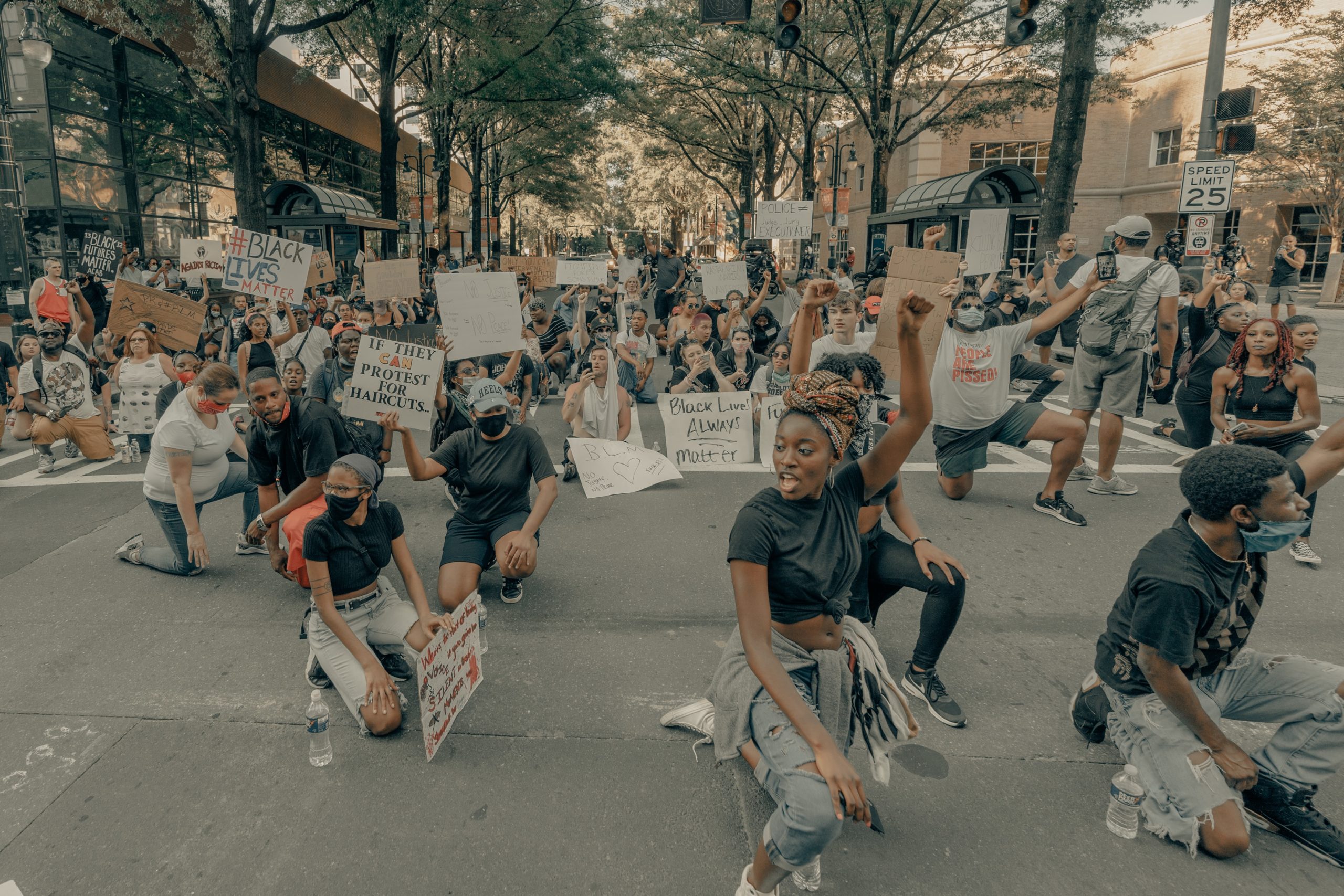
04 Jun HOW BRANDS CAN FIND THEIR VOICE IN FIGHTING RACISM
In the face of protests, riot and civil unrest, one thing is abundantly clear: racism in America must stop and brands can no longer stay silent. Nike ‘For Once, Don’t Do It,’ YouTube, NFL, Netflix, and Disney were among the first to vocalize their support. Facebook was harshly criticized and called hypocritical after being slow to respond to Tweets from President Trump about violence, then making a $10 million commitment to fight injustice.
For companies who want to take a stand, finding the right voice and words to express solidarity isn’t easy. Say the right thing and you bolster a relationship with loyal fans, say the wrong thing (or nothing) and you risk alienating or offending them. How do you show employees and customers that your values are more than just lip service, that you are committed to showing up for the black community? Zenzi’s creative director, painter, youth arts advocate, Rachel Znerold, shares her perspective below:
“I think we can all agree there’s a lot that’s broken and there’s a lot of pain and outrage. To move forward, we have to stop seeing race as a political issue. Race is a human issue. If your company is a human company, then this is your issue. It’s hard to know the exact right thing to say, but the worst thing is to not say anything at all.”
1) Be Human
Although it’s important to say something, putting out a vague statement can seem as disingenuous as staying silent. Many people were overwhelmed by feeds filled with generic statements from brands.
Says Znerold, “As consumers, we want to see that there are humans behind these companies, not just some plastic corporation. We want to connect with the story and humanity behind it.”
Now is the time to be transparent, even if it means admitting your company is not perfect, and that you can (and will!) be doing more. It’s okay to acknowledge that you don’t have it all figured out, as long as you are committed to listening and learning and being a part of the solution.
Avoid cold and impersonal messaging by focusing first and foremost on your people. Bring them to the center of your communication strategy and empower them to lead the way for you. Microsoft used its social channels to share quotes from black employees about how they are feeling and what allies can do for them during this troubling time.
2) Lead with Values
More and more, people are choosing to align with socially responsible businesses and will quickly jump ship if a company or brand doesn’t live up to their standards. In developing your statement, bringing it back to your company values gives people a reason to believe and strengthens your message.
For example, a restaurant whose core value is hospitality may talk about honoring their commitment to serving and welcoming and feeding people. As they could put it, ‘there’s no room in those beliefs for discriminating against people by the color of their skin.’
To increase exposure of underrepresented black artists, Spotify has been curating playlists to use the power of its platform to amplify voices and accelerate conversation and long-needed change. They also added an 8 minute and 46 second moment of silence to playlists and podcasts, to represent the amount of time George Floyd was pinned down by the neck by a police officer, which led to his death last week in Minneapolis, an example of contending directly and specifically with current events.
In another industry, LEGO announced that they would be donating $4 million to organization supporting black children and educating children about racial equality, as well as ceasing marketing of Police-themed LEGO sets and toys.
“Personally, I’m always more inclined to support businesses that are in alignment with my values. And when I see brands speaking out and leading the way on an issue like racial injustice, I’ll go above and beyond to buy from them, learn about their initiatives and how they’re supporting their communities,” Znerold said.
3) Share your Action Plan
Not only is it critical to speak out, but brands also need to back up their statements with concrete action plans outlining how they intend to create a more just and inclusive environment. They’ve got to show that their message is more than words. Tap into what they believe in as a company and what they want to accomplish in the future. What steps can they take that will have the biggest impact?
Says Znerold, “It’s time that we need to put our discomfort aside and do some hard work on ourselves. The first step is to look around and talk to our own friends, families, colleagues and have the difficult conversations. Then, we can find a way to use our resources to be a meaningful part of the solution.”
Ben and Jerry’s, who has long had a reputation for advocacy and calls itself a ‘social justice company that happens to make ice cream,’ released a forceful statement compelling Americans to “‘dismantle white supremacy”’ and “‘grapple with the sins of our past.”’ The unusually comprehensive and direct statement received praise from consumers for advocating for specific policies to prevent further police abuses and address racial inequality.
It doesn’t need to be a grand gesture (like Bank of America’s $1 billion, four year commitment to economic and racial inequality), but brands should take time to consider how they can provide real value to the community. It may be attracting more employees of color, mentoring young entrepreneurs, or partnering with a nonprofit for grassroots outreach.
Here at Zenzi, our first step is acknowledging that we still have work to do, especially with diversifying within our own company and starting conversations about awareness and action. Our CEO, Sarah Hardwick, said, “I believe, as leaders, we are on the frontlines of creating change. I’m working with the local and national entrepreneurial community, and working with our clients to have the tough conversations about areas that we know we’re weak, and to create a path for change and a more inclusive and just world in the future.”
For brands today, speaking up for the black community, acknowledging the pain that exists and admitting that we can be better takes courage. It’s also an opportunity…to engage with people on a human level, to inspire conversations, to stand together united and committed to change. How will you be a part of a movement towards peace, justice and a better tomorrow?




